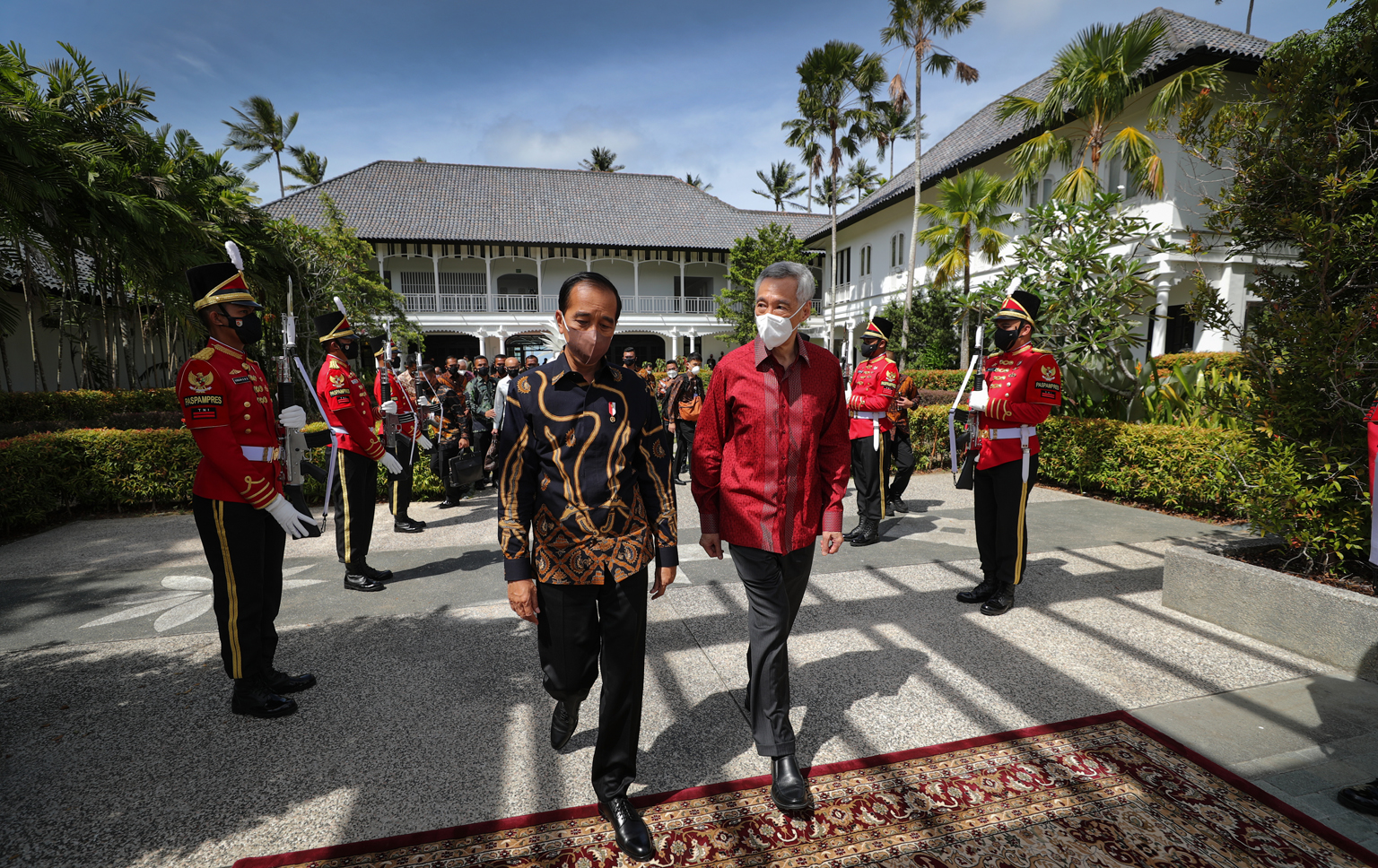S’pore-Indonesia Leaders’ Retreat: What agreements were signed?
Sign up now: Get insights on Asia's fast-moving developments

PM Lee Hsien Loong and Indonesian President Joko Widodo at The Sanchaya in Bintan for the Singapore-Indonesia Leaders' Retreat.
PHOTO: MINISTRY OF COMMUNICATIONS AND INFORMATION
Follow topic:
SINGAPORE - At the Singapore-Indonesia Leaders' Retreat on Tuesday (Jan 25), Prime Minister Lee Hsien Loong and President Joko Widodo witnessed the signing and exchange of three agreements as well as an exchange of letters undertaking to bring them into force at the same time.
Here are details of these pacts and what they cover, as well as five other agreements inked by both countries to coincide with the annual retreat.
1. Flight Information Region Agreement
Singapore and Indonesia have agreed to realign the boundary between the Jakarta flight information region (FIR) and the Singapore FIR.
Indonesia will delegate to Singapore the provision of air navigation services in portions of the airspace within the realigned Jakarta FIR.
The pact will remain in force for 25 years and can be extended by mutual consent if both parties find it beneficial to do so.
The FIR Agreement takes into account International Civil Aviation Organisation (ICAO) rules and regulations and will be submitted for approval to the ICAO in accordance with an agreed procedure.
2. Extradition Treaty
Singapore and Indonesia will grant extradition - the handover of individuals wanted for a crime in the other country - for a comprehensive list of extraditable offences covered by the treaty.
They will do so in accordance with the laws of both countries and subject to the requisite safeguards and provisions in the treaty.
They can also extradite individuals wanted for crimes dating back 18 years.
3. Joint statement between defence ministers on the 2007 Defence Cooperation Agreement and its implementing arrangement
The Defence Cooperation Agreement (DCA) will strengthen the strategic relationship between both defence establishments, and the Singapore Armed Forces (SAF) and Indonesian National Defence Forces (TNI), by enhancing cooperation and promoting closer interaction between both militaries.
As part of the DCA, the SAF will continue to conduct military training and exercises in training areas in Indonesia, with full respect for Indonesia's sovereignty over its territory, including its archipelagic and territorial waters and its airspace, and in accordance with the 1982 United Nations Convention on the Law of the Sea.
The DCA and its implementing arrangement between both armed forces for the military training area in Indonesia will remain in force for 25 years.
4. MOU on Financial and Economic Cooperation
The memorandum of understanding (MOU) on financial and economic cooperation formalises the longstanding and multi-faceted cooperation between the finance ministries of both countries in areas such as Customs cooperation and fiscal policy. It also allows for future partnership in emerging areas such as financial services, climate finance and the digital economy.
5. MOU on Bilateral Partnership on Green and Circular Economy Development
The MOU between Singapore's Ministry of Sustainability and the Environment and Indonesia's Ministry of National Development Planning seeks to promote new opportunities for green growth. Potential areas of collaboration include resource optimisation and recycling to address electronic, food and packaging waste, as well as potential private-sector projects and the sharing of expertise on waste management and green economy development.
6. MOU on Energy Cooperation
The MOU between Singapore's Ministry of Trade and Industry and Indonesia's Ministry of Energy and Mineral Resources will see both countries establish the Indonesia-Singapore Energy Workgroup. It will serve as a formal platform for officials to discuss and work together in areas that include facilitating cross-border electricity trading, financing of low-carbon energy infrastructure, and the development of new and emerging technologies such as hydrogen and carbon capture, utilisation and storage.
7. Human Capital Partnership Arrangement
The agreement between Singapore's Ministry of Education and Indonesia's Ministry of Education, Culture, Research and Technology formalises regular exchanges between educators and youth, including in the area of vocational education.
It also expands opportunities for Singaporean and Indonesian students to take part in exchanges and internships to deepen their understanding of each other's country and prepare them to better engage with the region.
Over the next few years, up to 500 Indonesian school leaders will attend training workshops by NIE International and be attached to Singapore schools.
Both ministries will also launch a youth mobility agreement to enable university students to embark on internships with companies in the two countries, for up to six months.
8. MOU between Monetary Authority of Singapore and Bank Indonesia
The MOU reflects Indonesia and Singapore's joint interest to promote collaboration on projects in relation to payments innovation, and formalise cooperation across an expanded range of central bank and regulatory functions.
These include monetary policy, macro-prudential policy, financial stability, oversight of payment and settlement systems, regulatory and supervisory frameworks, and anti-money laundering and countering the financing of terrorism.

